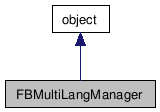

The class FBMultiLangManager indicates the supported languages and allows to query and change the current language.The support for localization is done using conversion tables from internal names to language specific names, so that they can be used in the GUI and other human readable contexts.At this time, changing the current language will not affect the GUI. Only calls to functions 'FBGetMultiLangText()' will be affected.The following sample code lists the names of the supported languages:Python sample code:
from pyfbsdk import *
lManager = FBMultiLangManager()
print 'Current localization language: ', lManager.GetCurrentLanguage()
print 'Supported languages:'
for lLanguage in lManager.Languages:
print ' ', lLanguage
C++ sample code:
FBMultiLangManager lManager;
FBTrace( "Current localization language: %s\n", lManager.GetCurrentLanguage());
FBTrace( "Supported languages:\n" );
int lIdx = 0;
while( lIdx < lManager.Languages.GetCount())
{
FBTrace( " %s\n", lManager.Languages[lIdx++] );
}
Public Member Functions |
|
| FBMultiLangManager () | |
| Constructor. |
|
| str | GetCurrentLanguage () |
| Obtain the current language. |
|
| bool | SetCurrentLanguage (str pLanguage) |
| Set the current language. |
|
Public Attributes |
|
| FBStringList | Languages |
| List of available languages. |
|
Constructor.
| str GetCurrentLanguage | ( | ) |
Obtain the current language.
Query the current language used for the GUI.
Set the current language.
Change the current language to another available language.
| pLanguage | The string corresponding to the desired language, as defined in property Languages. |
List of available languages.
 1.5.3
1.5.3